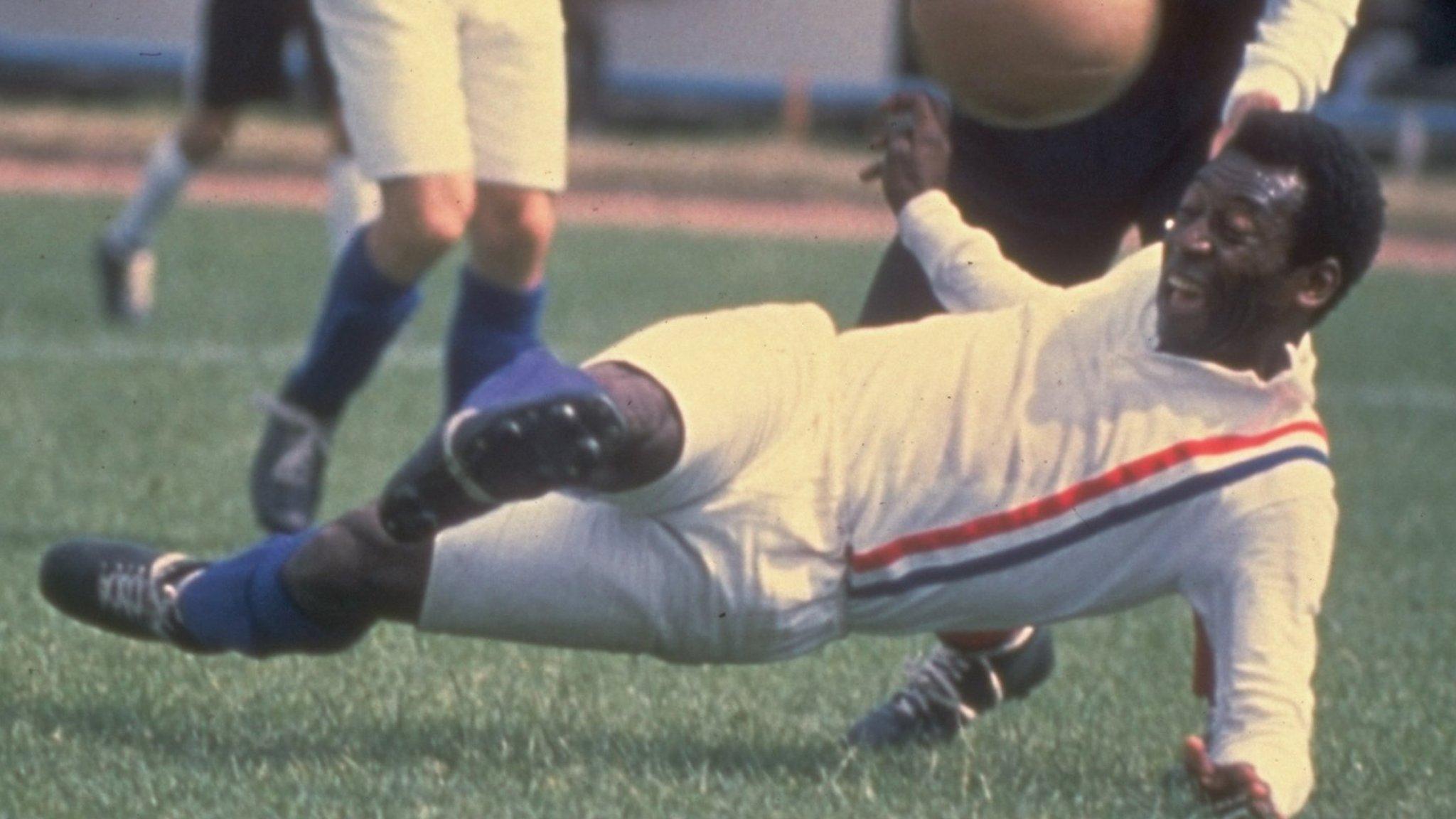Escape to Victory: The Ipswich footballers who made a cult classic
- Published
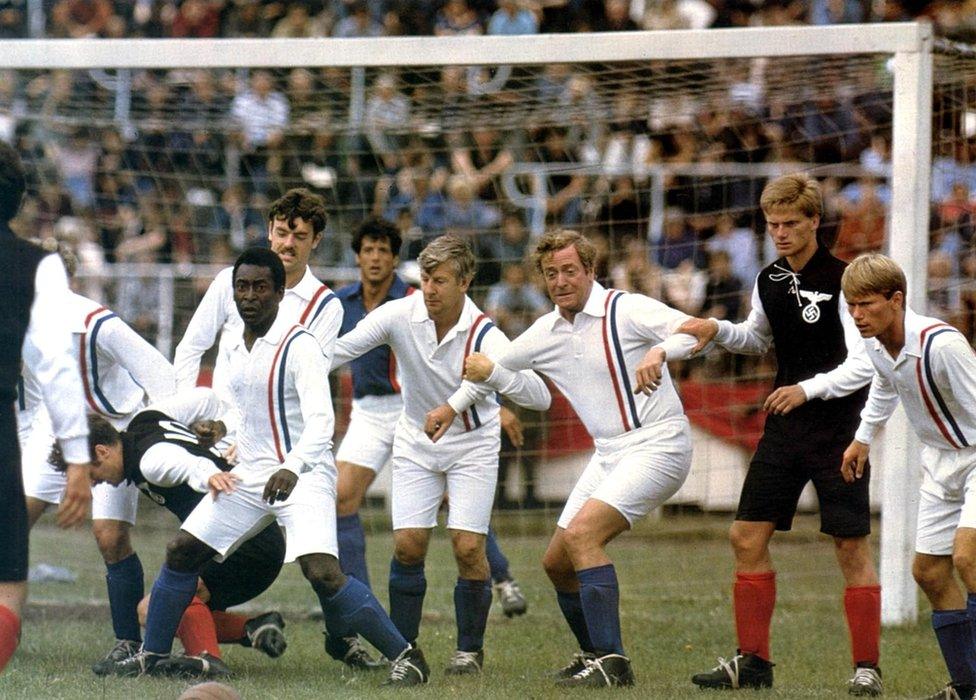
"There was Kazimierz Deyna, Ardiles, Co Prins and everyone else," says Russell Osman. "Crikey, there's some terrific international players here"
Forty years ago the worlds of film and football collided, as superstars including Sylvester Stallone and Michael Caine joined forces with some of the world's best players to tell the story of how a group of prisoners of war took on their Nazi captors.
Escape to Victory pulled together an enviable team made up of stars including World Cup winners Pele, Bobby Moore and Osvaldo Ardiles - and several players from Ipswich Town.
Fans of the Suffolk club, currently in the third tier of English football, take pride in their involvement and see it as something to be celebrated, along with the silverware they won several decades ago.
But what do the players remember of the experience?
'Out of our comfort zone'
Ipswich Town were a force to be reckoned with in the early 1980s. They had won the FA Cup in 1978 and continued to improve, under the guidance of Sir Bobby Robson.
Two months before Escape to Victory's US release on 31 July 1981, they had lifted the Uefa Cup before narrowly missing out on the domestic league title.
"Bobby Robson called a meeting in the changing room one day and mentioned to the lads if anybody wasn't doing anything in the summer and wanted to go and help in the making of this film we were free to do so," says former Ipswich and England defender Russell Osman.
"I was single at the time, hadn't got anything arranged or booked, so I said 'Yeah, fine'."
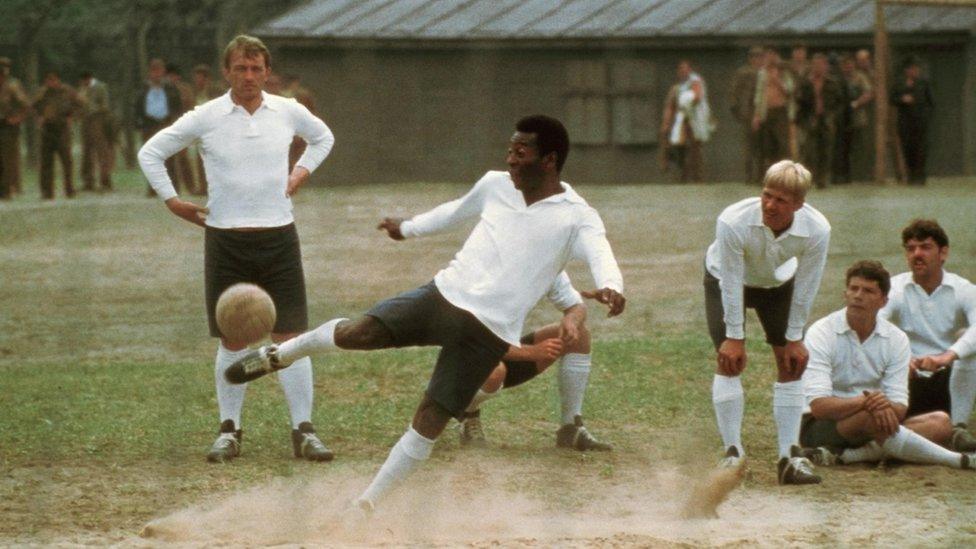
Laurie Sivell says Pele was an incredible talent and "a lovely man" who "would be doing keepy-ups while giving interviews"
Filming took place in Budapest during summer 1980, and Osman's teammates John Wark, Kevin Beattie, Laurie Sivell, Kevin O'Callaghan, Robin Turner and Paul Cooper also agreed to take part.
"As far as we knew then it was just a case of going out there and filming some background shots of people playing football, while the rest of the film was being shot," Osman continues.
"It wasn't until we got there that we realised it was a bit more involved than that.
"When we first got out there they gave me a script and said, 'The character you're playing is Doug Clure.'
"The next morning I was face-to-face with Michael Caine, doing the dialogue that's in the film."
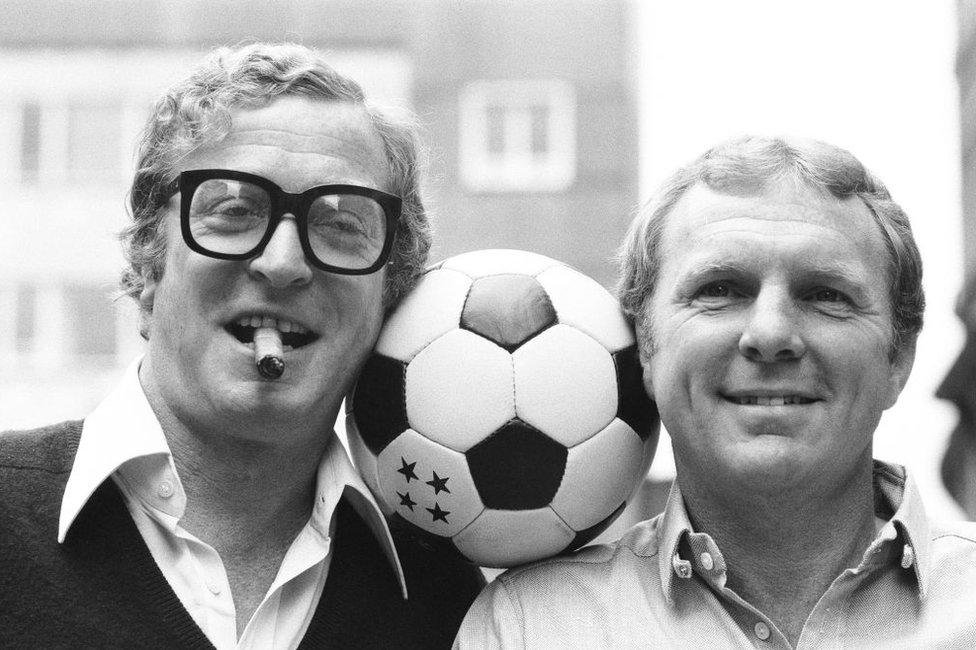
John Wark says it was fun to share stories with the likes of Michael Caine and Bobby Moore every evening during filming
The plot of Escape to Victory, or Victory as it was called in the US, is driven by Caine's character, Colby, and his desire to arrange a football match between his fellow prisoners of war and a German team.
When the Germans finally agree to host the game in a full stadium in Paris, the Allied prisoners see a perfect opportunity to escape.
While fictional, the story is partly inspired by FC Start, a wartime Kiev side that took on and beat their Nazi occupiers.
Osman says Caine helped the footballers transition into temporary film stars.
"We were all really out of our comfort zone, being in a position that we'd never been in before," he says.
"I remember sitting in the hut in the prisoner of war camp where my first scene was going to be shot and Michael Caine walked in, and for about half an hour he just told stories and made everybody laugh.
"Then all of a sudden it was a case of 'Ok, let's get this in the can, Russell'.... bang, bang, bang and before you knew it we were doing it and it was done.
"He was very, very good - a proper gentleman, a proper bloke."
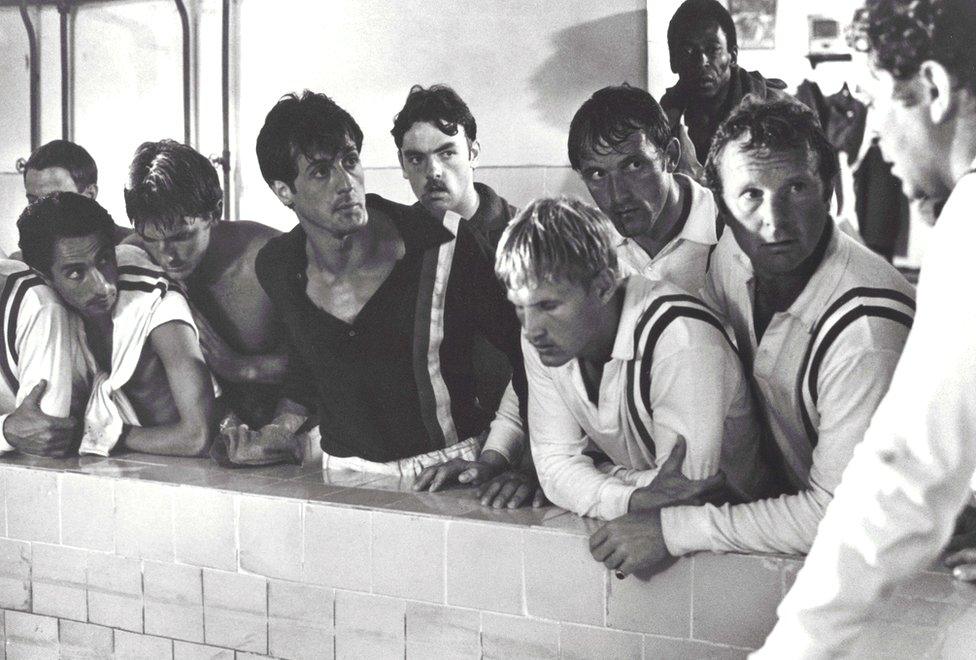
Osman (to the left of Sylvester Stallone) was given a key line in the film as the players decide not to escape at half-time
The Ipswich players have been less forthcoming in their praise for Stallone, who had already made the first two Rocky films and was a major star.
Beattie, who died in 2018, wrote about his time on the film in his 1998 autobiography, and his joy at winning $100 from Stallone by beating him at arm-wrestling.
Former Scotland international Wark, who played midfielder Arthur Hayes in the film, laughs at the memory.
"The Beat took him on and did him easy, as usual," says Wark. "One take, bump, he was straight down.
"You wouldn't take The Beat on - he would beat anybody."
You might also like:
Stallone's character, Robert Hatch, spends much of the film trying to convince Colby that he should be part of the Allied team, but these pleas fall on deaf ears until it becomes clear that he is a pivotal part of the planned escape.
And so the unfancied American joins the team, at the expense of O'Callaghan's character, who has to have his arm broken to make the switch seem plausible.
Wark says being a goalkeeper didn't come naturally to Stallone.
"When he was a goalkeeper he said to the director 'Can I score the winning goal?', and we'd say 'You're the goalkeeper!'.
"In the end they make him a hero by saving a penalty, but when we were doing rehearsals it took him about six takes before he could even get near one.
"We'd be chipping balls in and he was meant to save them, but he didn't know what to do."
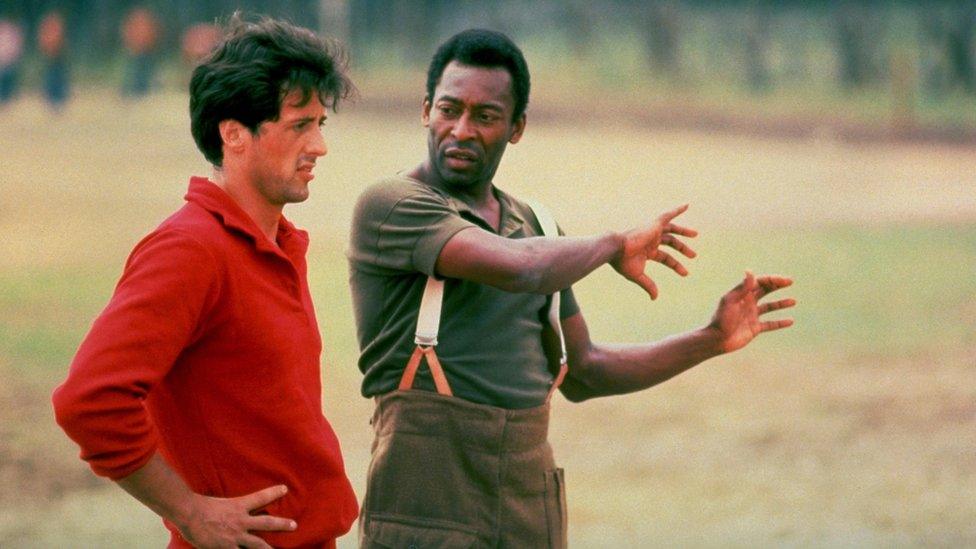
Stallone and Pele lined up in the same team in the film
Sivell, a goalkeeper with Ipswich, offered Stallone some help.
"I gave him a lesson at one point," he says. "He'd pick the ball up and bounce it around like a basketball player - I expected him to try and dunk it in the goal."
Wark describes the filming as being the "best five weeks" of his life, and talks fondly of nightly "drinks and meals with superstars".
He, too, had some lines of dialogue, but was in for a surprise when the time came to watch Escape to Victory in the cinema.
"I was at the premiere at the Gaumont in Ipswich with a few of the players - those who were in it and others," the Glaswegian says.
"I was sitting beside Alan Brazil and Eric Gates and I go to them 'Right lads, this is me, I'm going to be speaking my two lines.'
"I walk in and bloody hell, that's not my voice - that's an Edinburgh accent! They were laughing their heads off.
"Even now some people don't understand me. It was embarrassing, but I thought it was quite funny."
Wark's discovery that his voice had been dubbed was not the only disappointment for the Ipswich players.
Sivell says he was initially meant to have the goalkeeper role played by O'Callaghan, a winger for Ipswich, but "my voice was very gruff back then".
"So I was relegated to the German goalkeeper," he says. "I had blonde hair back then so I probably fitted in with the Aryan look they were going for."
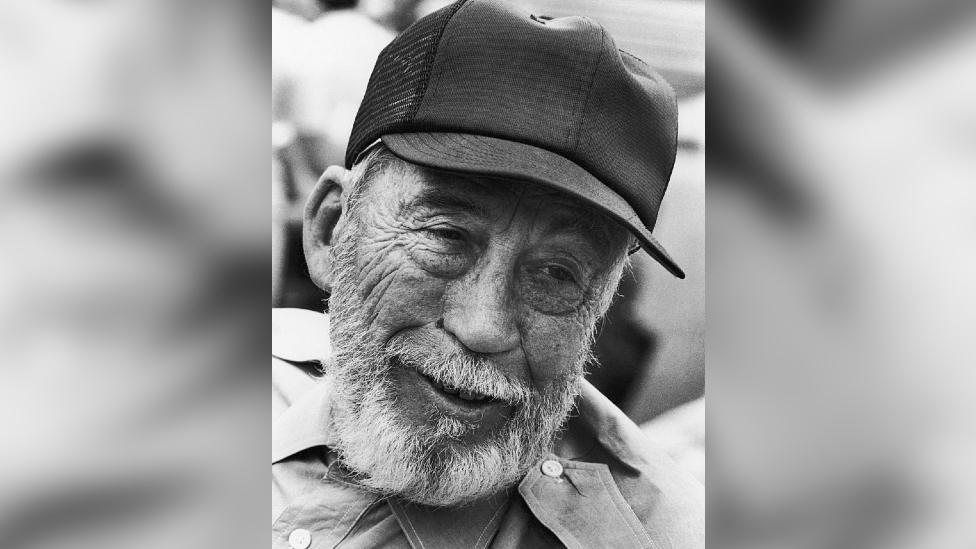
Oscar-winner John Huston was credited with trusting the footballers to dictate the on-field action
As with the footballing and acting talent, Escape to Victory had an A-lister for a director.
John Huston won the best director Oscar in 1949 for The Treasure of the Sierra Madre and other career highlights include The African Queen, The Maltese Falcon and Annie.
Osman, Wark and Sivell all credit Huston with making a film that portrays a realistic football match, something that other movies have struggled to achieve.
But Osman remembers a dispute as to how the "soccer" match would be filmed, with the cast of international players finally having an influence on proceedings.
"I think Bobby Moore, Mike Summerbee, Pele and Werner Roth had a meeting with John Huston and basically said 'We'll tell you what to do and how to do it, you just make sure you've got the cameras there'," he says.
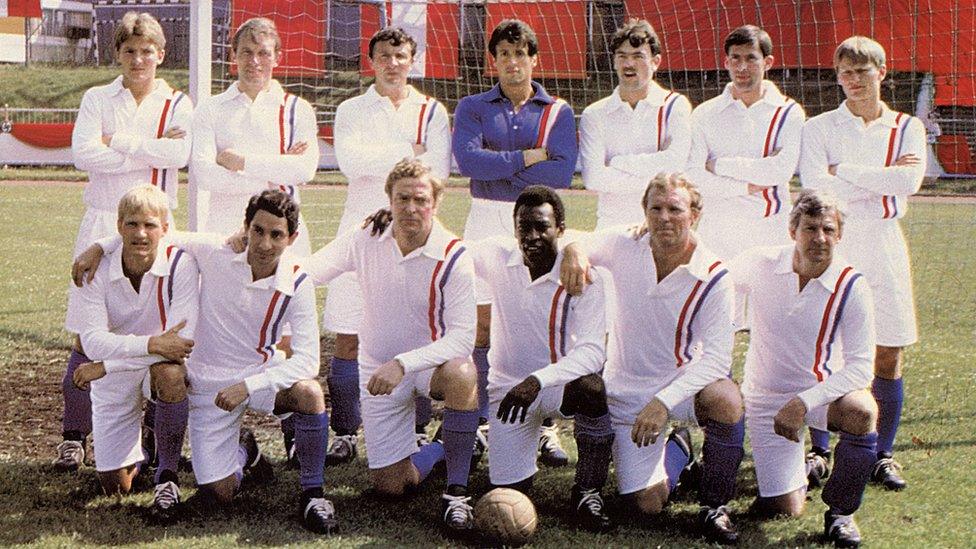
"It's not a bad team", says John Wark (back row, third from right). "I think we'd struggle if we kept Stallone in goal."
Locals were invited to attend the match and were then shuffled around the ground at various points to give the impression the stadium was full.
As the film reaches its climax, the action cuts between the match and scenes from beneath the stadium, where a tunnel is being dug so the players can escape at half-time.
The Allies walk off the field demoralised by a 4-1 drubbing in the first 45 minutes, but their spirits are lifted as they see their rescuers break through the bottom of a shared bath.
As the players head towards the tunnel - and freedom - it is Osman's character who speaks up.
"I don't want to go back - we can win this," he says, galvanising the Allies, who decide to return to the pitch rather than making a run for it.
"I had a few nice lines in it," says Osman. "That was a bonus for me amongst everything else - apart from just the playing, my lines weren't doctored or cut or anything."
They think it's all over...
The second half sees the Allies take the initiative and fight back to just a one-goal deficit.
And then, in a moment that will go on to define the rest of his life, Osman pounces on the ball as it rebounds off a post and taps home to seal a famous 4-4 draw.
Well, almost.
"It was unbelievable," says Osman. "The ball comes back off the post and I'm given offside.
"It would have been nice to have been credited with the goal, as I didn't score than many from centre half, but it's just one of those things."
Instead, it's Pele who grabs the leveller, with an overhead kick that is so good viewers get to watch it several times in slow motion. Even the German officers get on their feet to applaud his athleticism.
"We did it a few times until we could get it right," says Sivell, who also gets the slow-motion treatment from what was a high-tech piece of equipment back then, as he dives to try and stop the ball from going in.
In a reference to a breakfast cereal advert - in which a 'keeper trips and falls on his face as he tries to save a shot - he says: "I tried to save it - it wouldn't have looked very good if I did a Weetabix dive to let it in. It had to look realistic."
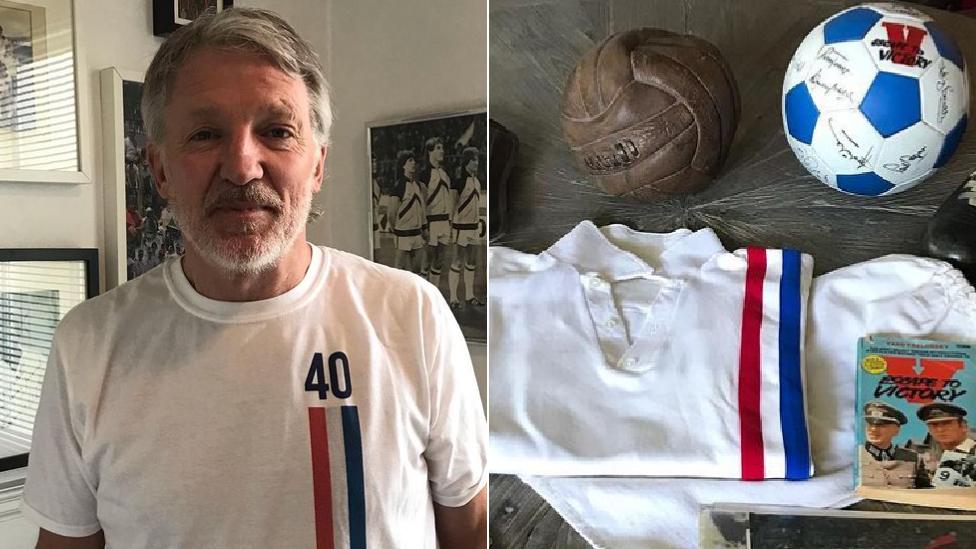
Russell Osman, pictured wearing a T-shirt marking the 40th anniversary and in front of a photo signed by Pele, still has souvenirs from the film
Escape to Victory remains a regular fixture on TV, and normally coincides with increased activity on Wark's phone.
"To this day I get calls from friends and family saying 'You're on the telly again', and I'm like 'What is it, Crimewatch?' he says.
"The amount of times people come up to me in Tesco or Asda and say that I was in it - I have to remind them about my football career.
"I'm just proud to have been in it. It's good for Ipswich because they had so many players in this famous movie, and it's good for Ipswich, the town itself."
It has previously been reported that the Ipswich players received £6,000 each for their work on the film. Sivell says he can't remember the exact figure but "we all knew it was much less than everyone else was getting".
Both he and Wark can remember a group of players raising the issue with producer Freddie Fields, in the hope of getting a bigger slice of the pie.
"I went up to his hotel room," recalls Wark. "Speaking on behalf of Ipswich Town, I said 'I think we should get more money or royalties or we're seriously thinking of leaving.'
His request was turned down.
"I had to go back to the lads and say 'We're staying.' But imagine if we'd got royalties."
'It's nice it became an iconic movie'
After filming was completed Wark kept hold of his Allied shirt and "shorts that went down to the knees", but later gave them to charity.
Sivell still has his German goalkeeper shirt tucked safely away, along with a signed script.
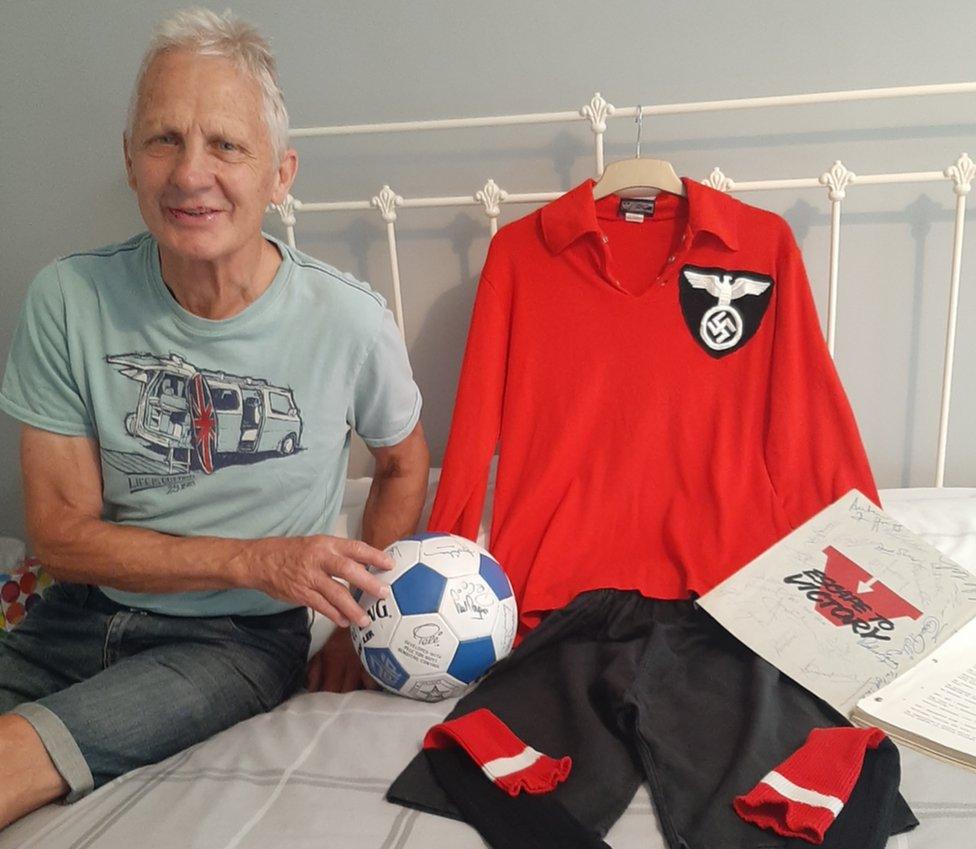
Pele and other members of the cast signed the script that Sivell has kept
Osman, meanwhile, has an enviable collection including the Allied kit, boots, a signed ball and a director's chair.
"It's nice to have something that you can hang on to," he says. "And it's nice that the film has turned into a bit of an iconic movie.
"In a way it fills a nice part of that era - the side I played with between 1980 and 1982.
"We won the Uefa Cup, came runners-up in the league two years running and did Escape to Victory - a hell of a lot crammed into this three-year period.
"I look back and I think 'what a good decision I made to go out and do it'."

Find BBC News: East of England on Facebook, external, Instagram, external and Twitter, external. If you have a story suggestion email eastofenglandnews@bbc.co.uk, external
Related topics
- Published23 June 2021
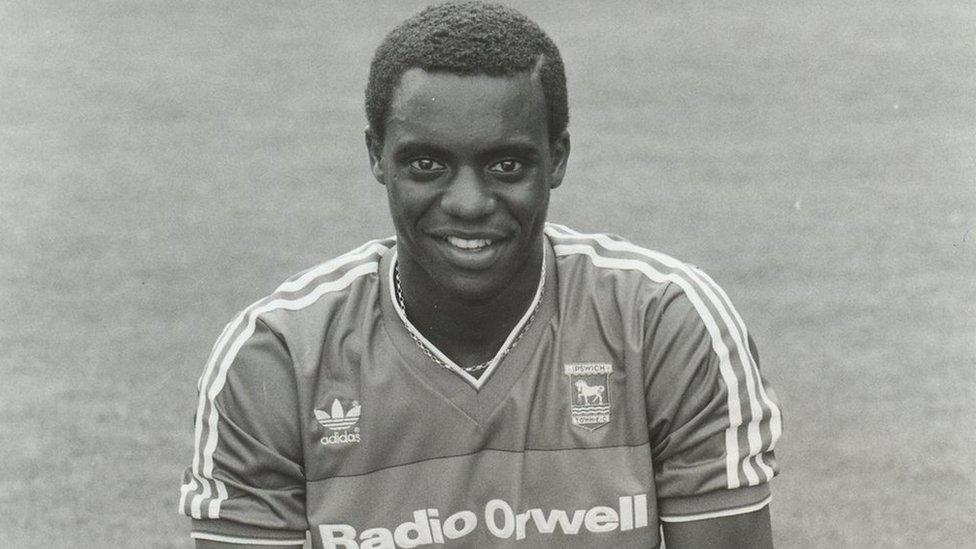
- Attribution
- Published7 June 2016
